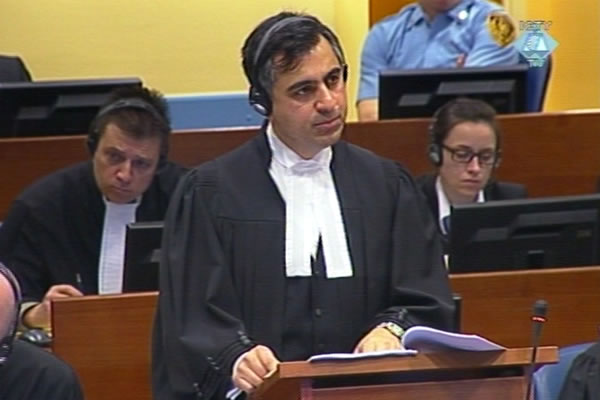Home
DEFENSE CALLS FOR GOTOVINA’S ACQUITTAL ON ALL CHARGES
At the half-time of the trial for crimes committed during and after Operation Storm, the defense counsel call for the acquittal of General Ante Gotovina on all counts in the indictment. According to the defense, the prosecution has failed to call evidence which could lead to his conviction
 Payam Akhavan, branilac Ante Gotovine
Payam Akhavan, branilac Ante Gotovine The defense counsel of the former Split Military District commander Ante Gotovina, called for the acquittal of their client on all nine counts in the indictment charging him, together with generals Ivan Cermak and Mladen Markac, with persecution, deportation, forcible transfer of Serb civilians, looting and destruction of abandoned Serb property, killing and inhumane treatment during and after Operation Storm in August 1995. According to the defense, the prosecution has failed to prove the existence of the joint criminal enterprise aimed at expelling the Serbs from Krajina. Even if it managed to prove it existed, the defense noted, nothing points to General Gotovina participation in it.
Rule 98 bis allows the Trial Chamber to dismiss all counts in the indictment the prosecution has failed to prove. The 98 bis hearing was opened today by a member of Gotovina’s defense team, Payam Akhavam. In his words, ‘the gist of the theory’ of joint criminal enterprise was based on the prosecution allegation that there was ‘unlawful and disproportionate shelling’ of civilian targets in Knin and other Krajina towns aimed at forcing the Serb population to flee. The defense challenged the prosecution argument that the existence of such a plan could be seen from the Brijuni transcripts. Immediately before Operation Storm, President Tudjman met at Brijuni with top Croatian military and police officials. The fact that there was no such plan could be seen from what went on in the field, the defense argued.
As Akhavan put it, Knin and other Krajina towns were shelled with ‘extreme accuracy’ and minimal collateral damage in the immediate vicinity of military targets. The Croatian artillery, Akhavan said, fired on military targets; this challenges the prosecution argument about the ‘unlawful attack against civilians’ and consequently the very existence of joint criminal enterprise. ‘There is no evidence of any unlawful attacks by the Croatian artillery against civilians or of any widespread artillery campaign’, the defense counsel concluded.
The defense went on to claim that there were no deportations and forcible transfer; the people left Krajina before the Croatian army and police arrived. Those people would have left Krajina even if the Croatian side hadn’t used its artillery and had the territory been liberated by some other means; as the defense sees it, the main reason why the Serbs left was Serb propaganda claims that Serbs and Croats couldn’t live together and the evacuation plan of 4 August 1995 signed by Milan Martic, the RSK president.
The defense doesn’t contest the fact that a significant number of abandoned Serb properties were looted and burned down in the liberated territory in August 1995. However, according to the defense, the crimes were perpetrated by ‘an unruly mob’, without the approval and support of Croatian authorities. General Gotovina did everything he could to prevent crimes and punish perpetrators by issuing numerous orders and taking disciplinary measures, the defense argues. According to the defense, not enough evidence has been called to prove that the accused general had the authority over the military police in respect of investigating crimes; military police chief Mate Lausic was responsible for that. Lausic was a key prosecution witness. The defense counsel also claimed that there was not enough evidence that their client knew or had reason to know that his subordinates were killing civilians.
As today’s hearing drew to a close, General Ivan Cermak's defense began presenting its arguments for his acquittal at the half-time of the trial. As Cermak’s defense counsel Steven Kay put it, the prosecution has failed to prove that Cermak, as the Knin Garrison commander, had effective control over the military forces in that area or that he had the capability to prevent crimes or punish perpetrators.
The Rule 98 bis hearing continues tomorrow.
Linked Reports
- Case : Gotovina et al. - "Operation Storm"
- 2009-03-05 PROSECUTION RESTS ITS CASE AT OPERATION STORM TRIAL
- 2009-02-23 WITNESS CONTESTS BRIJUNI TRANSCRIPTS
- 2009-02-20 LOOKING FOR MARTIC IN KNIN WITH SHELLS
- 2009-03-20 DEFENSE CALLS FOR ACQUITTAL OF CERMAK AND MARKAC
- 2009-03-23 PROSECUTION: ENOUGH EVIDENCE AGAINST CROATIAN GENERALS
- 2009-03-24 DEFENSE: 'PROSECUTION'S LEGAL HODGEPODGE'
